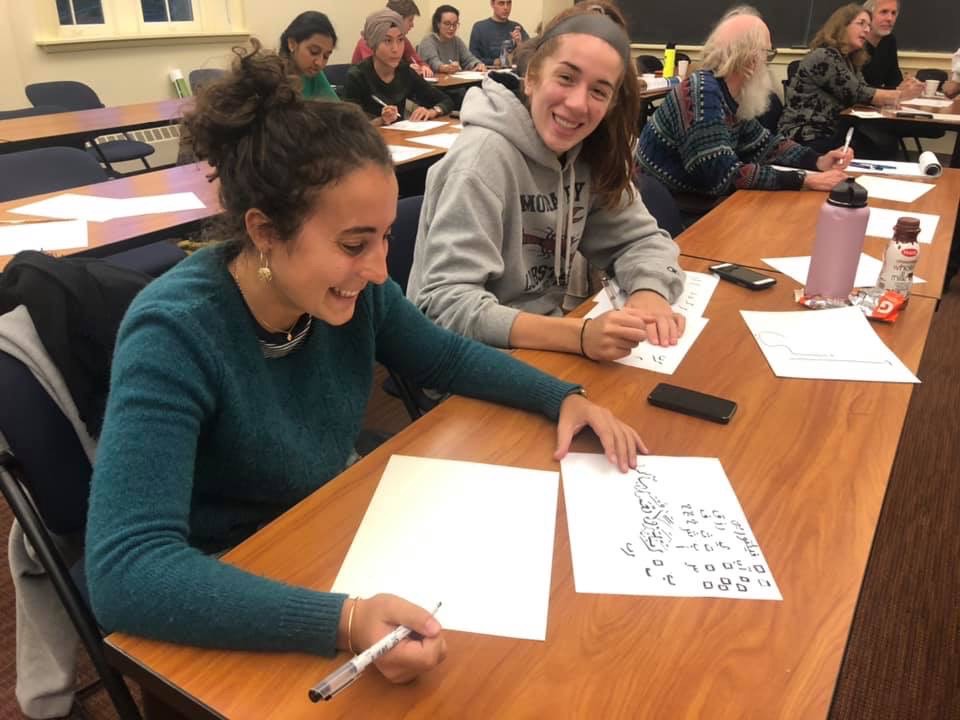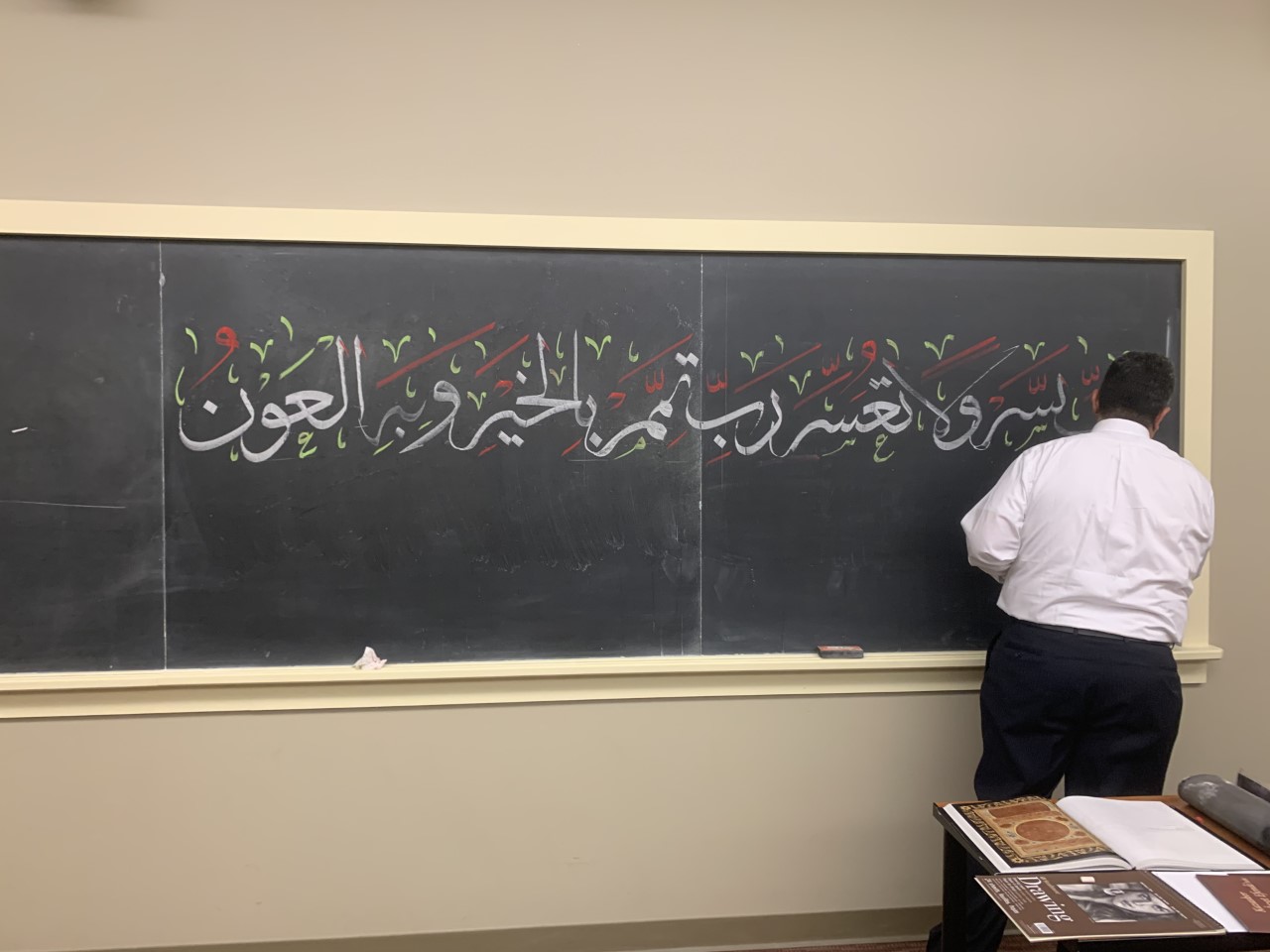New Arabic club promotes language, culture
November 15, 2019
During his first semester at Bowdoin, Joe Hilleary ’20 signed up for an introductory Arabic class. He did not have any previous experience, and he definitely did not expect to fall in love with the language. Now, he is president of the newly chartered Al-Nadi Al-Arabi (“The Arabic Club”) and aims to build a more visible Arabic-speaking community on campus.
For a long time, Arabic at Bowdoin has existed only on the periphery. Though classes in Arabic have been offered since 2008, there is not currently an Arabic department and there are therefore no majors or tenured faculty members. Until last year, the program had only one lecturer, Russell Hopley, who only taught classes through the intermediate level. The College established minors in Arabic and Middle Eastern and North African Studies at the beginning of this year, but formal support systems outside the classes are essentially nonexistent. The Arabic language table, for example, is held very irregularly.
“One of the persistent problems [at Bowdoin] is there’s no formal academic structure to support Arabic the way there is for all the other languages,” Hilleary said. “[Arabic] sort of exists in a weird space, which makes it hard for there to be long-term continuity.”
Hilleary hopes that Al-Nadi Al-Arabi will be the first step toward building a larger student base that will eventually lead a change at the institutional level: the establishment of an Arabic department at Bowdoin.
 Courtesy of Nora Greene
Courtesy of Nora Greene“I would love to be able to come back in five years and see an established department,” Hilleary said. “It would be incredible if we could have a base from which programming can happen.”
For now, Al-Nadi Al-Arabi is trying to fill that gap. The young club has already helped the Arabic program immensely, said Andrew W. Mellon Postdoctoral Fellow in Arabic Pamela Klasova.
“[Al-Nadi Al-Arabi] having events helps us to build the Arabic program and the Arabic community,” Klasova said in a phone interview with the Orient. “When I came to Bowdoin and the Arabic program was being built, I didn’t expect so many students to be so active and so interested. It’s just wonderful.”
According to Hilleary, the primary challenge that faces those hoping to cultivate a stronger Arabic-speaking presence on campus is the difficulty of the language itself. Most students have never had the opportunity to learn Arabic before attending Bowdoin and when they begin, they meet four days a week to learn a language with an alphabet and grammatical structure that are new to most English speakers.
“We’re trying to figure out other ways for people to engage in supporting those students [of Arabic] because it takes a lot of time—it is an encompassing endeavor,” Hilleary said. “We see that one way to do that is by getting people engaged with the language outside [the classroom].”
“I’d love to see … an Arabic-speaking community that’s visible, that’s doing things on campus and feels comfortable existing in its own space,” Hilleary added.
Earlier this year, Al-Nadi Al-Arabi hosted a panel of students who have studied abroad in the Middle East or North Africa to discuss their experiences with interested students. The club also worked with the Arabic program to host a calligraphy workshop over Family Weekend. It was led by Muhammed Habib, a calligraphy instructor from Harvard University.
 Courtesy of Nora Greene
Courtesy of Nora GreeneBy garnering broader student interest in the language, Hilleary also hopes to combat misconceptions and stereotypes about the Arab world.
“[It] is a really vibrant and dynamic part of the world. Oftentimes, the only coverage we see is very sad or violent [or] tragic. And that’s really an image we want to dispel, through getting people to engage with other aspects [of Arabic culture],” Hilleary said.
This Saturday, the club will be making luqaimat—a doughnut-type sweet popular in the Middle East—by using translated recipes and following along with an Arabic cooking show. The event will take place from 1 p.m. to 4 p.m. at Boody-Johnson House.
“Anyone who wants to can come and enjoy this experience [and] learn how to cook a traditional Arab dessert,” Hilleary said. “Those who want to can engage in Arabic, learn additional kitchen vocabulary, food vocabulary, practice that in a different kind of setting than sitting in a classroom.”
Hilleary said that the club aims to host one more large celebration at the end of the year.
Moving forward, Hilleary wants to continue to build momentum within the student body for more engagement with Arabic.
“All of the changes that have happened in the last few years have been the result of years of students saying, ‘it’s ridiculous that Bowdoin doesn’t have Middle Eastern studies. It’s absurd that we only have one professor for Arabic who only teaches through intermediate,’” Hilleary said. “And I think that’s that student aspect—that student voice is so important in where the College chooses to put its focus. I see the club as a way for students to show their enthusiasm for this language, this culture, this area of study.”

Comments
Before submitting a comment, please review our comment policy. Some key points from the policy: